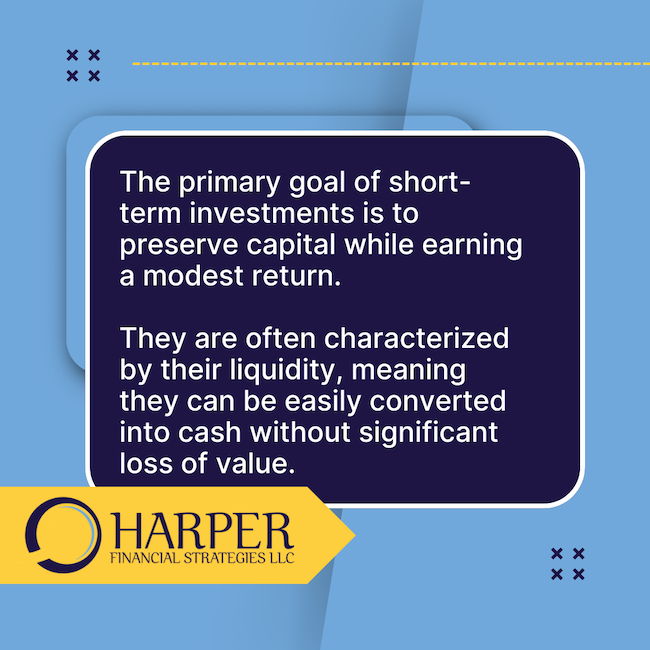In the fast-paced world of finance, where change is the only constant, the need for short-term investment options has never been more pronounced. Whether you're a seasoned investor or a novice dipping your toes into the investment pool, understanding the nuances of short-term investments can be a game-changer. At Harper Financial Strategies, we believe that every financial journey is unique, and we're here to guide you through the intricate maze of short-term investment options.
What Are Short-Term Investments?
Before diving into the specifics, let's clarify what we mean by short-term investments. These are financial instruments or assets that are typically held for a period ranging from a few months to a couple of years. The primary goal of short-term investments is to preserve capital while earning a modest return. They are often characterized by their liquidity, meaning they can be easily converted into cash without significant loss of value.
Why Consider Short-Term Investments?
Short-term investments offer several advantages that make them appealing to a wide range of investors. Firstly, they provide liquidity, allowing investors to access their funds relatively quickly. This is particularly beneficial for individuals who may need to tap into their savings for unexpected expenses or opportunities. Secondly, short-term investments generally carry lower risk compared to long-term investments, making them suitable for risk-averse investors or those looking to diversify their portfolios.
Exploring the Best Short-Term Investment Options

High-Yield Savings Accounts
High-yield savings accounts are a staple in the world of short-term investments. Offered by banks and credit unions, these accounts provide a safe place to park your money while earning interest at rates higher than traditional savings accounts. The beauty of high-yield savings accounts lies in their simplicity and accessibility. You can typically open an account online within minutes, and your funds are insured by the FDIC up to $250,000.
Certificates of Deposit (CDs)
Certificates of Deposit, or CDs, are another popular short-term investment option. When you invest in a CD, you're essentially lending your money to the bank for a fixed period, ranging from a few months to several years. In return, the bank pays you interest at a predetermined rate. CDs are known for their safety and predictability, as they offer a guaranteed return on investment. However, it's important to note that withdrawing funds before the CD matures may result in penalties.
Treasury Bills (T-Bills)
For those seeking government-backed security, Treasury Bills, or T-Bills, are an excellent choice. These short-term debt securities are issued by the U.S. Department of the Treasury and have maturities ranging from a few days to one year. T-Bills are considered one of the safest investments available, as they are backed by the full faith and credit of the U.S. government. They are sold at a discount to their face value, and investors receive the full face value upon maturity.
Money Market Funds
Money market funds are mutual funds that invest in short-term, high-quality debt securities, such as Treasury bills and commercial paper. These funds aim to provide investors with a high level of liquidity and a stable net asset value. Money market funds are an attractive option for those seeking a higher yield than traditional savings accounts while maintaining a low level of risk. However, it's essential to understand that money market funds are not insured by the FDIC.
Corporate Bonds
Corporate bonds are debt securities issued by companies to raise capital. While they carry more risk than government securities, they also offer the potential for higher returns. Short-term corporate bonds, with maturities of less than five years, can be a valuable addition to a diversified investment portfolio. It's crucial to conduct thorough research and assess the creditworthiness of the issuing company before investing in corporate bonds.
Peer-to-Peer Lending
In recent years, peer-to-peer (P2P) lending platforms have gained popularity as an alternative investment option. These platforms connect borrowers with individual investors willing to lend money at agreed-upon interest rates. P2P lending offers the potential for attractive returns, but it also comes with higher risk compared to traditional investments. Investors should carefully evaluate the creditworthiness of borrowers and diversify their lending across multiple loans to mitigate risk.
Exchange-Traded Funds (ETFs)
Exchange-Traded Funds, or ETFs, are investment funds that trade on stock exchanges, similar to individual stocks. Short-term bond ETFs, in particular, invest in a diversified portfolio of bonds with maturities of less than five years. These ETFs offer investors exposure to the bond market with the added benefit of liquidity and ease of trading. They are an excellent choice for those seeking diversification and flexibility in their short-term investment strategy.
Balancing Risk and Reward
When considering short-term investment options, it's essential to strike a balance between risk and reward. While short-term investments generally carry lower risk, they also tend to offer lower returns compared to long-term investments. As investors, we must assess our risk tolerance, financial goals, and time horizon before making investment decisions.
The Role of Diversification
Diversification is a fundamental principle of investing that applies to short-term investments as well. By spreading your investments across different asset classes and securities, you can reduce the overall risk of your portfolio. For instance, combining high-yield savings accounts with short-term bond ETFs and Treasury bills can provide a balanced mix of safety and potential returns.
Tax Considerations
It's important to consider the tax implications of short-term investments. Interest earned from savings accounts, CDs, and T-Bills is generally subject to federal income tax. Additionally, short-term capital gains from the sale of investments held for less than a year are taxed at ordinary income tax rates. Consulting with a tax advisor can help you navigate the complexities of tax-efficient investing.
The Impact of Inflation
Inflation is a critical factor to consider when evaluating short-term investments. While these investments offer liquidity and safety, their returns may not always keep pace with inflation, eroding the purchasing power of your money over time. It's essential to weigh the potential impact of inflation against the benefits of short-term investments and consider strategies to mitigate its effects.
Conclusion: Crafting Your Short-Term Investment Strategy
In the ever-evolving landscape of finance, short-term investments play a vital role in achieving financial goals and managing risk. Whether you're looking to build an emergency fund, save for a short-term goal, or diversify your portfolio, the options are vast and varied. At Harper Financial Strategies, we are committed to empowering you with the knowledge and tools needed to make informed investment decisions.
As you embark on your short-term investment journey, remember that there is no one-size-fits-all approach. Your strategy should align with your unique financial situation, risk tolerance, and objectives. By carefully considering the options outlined in this guide and seeking professional advice when needed, you can unlock the potential of short-term investments and pave the way for a secure financial future.
Investing is a journey, and we're here to walk alongside you every step of the way. Let's unlock the potential together.

